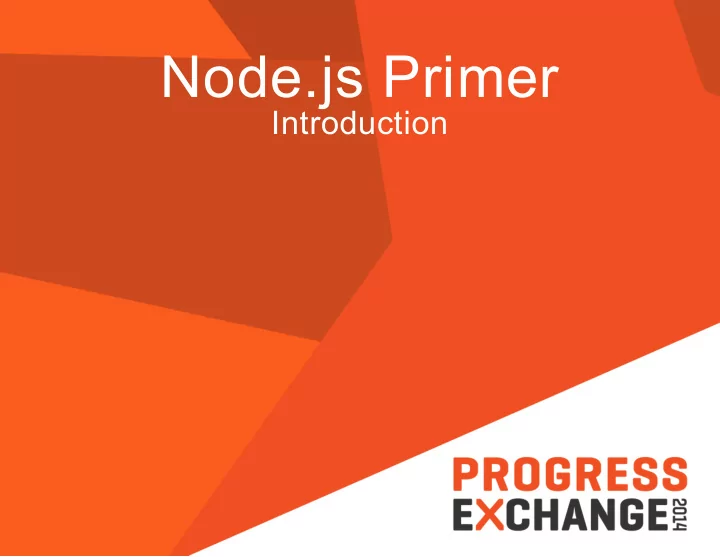

var http = require('http'); http.createServer(function (req, res) { res.writeHead(200, {'Content-Type': 'text/plain'}); if(req.url.toLowerCase() === '/hello' && req.method === 'GET') { res.end('World!'); } else { res.end('Try GET /hello.'); } }).listen(1337); console.log('Server running at http://localhost:1337/'); http-module.js - 10 lines of JavaScript
var http = require('http'); http.createServer(function (req, res) { res.writeHead(200, {'Content-Type': 'text/plain'}); if(req.url.toLowerCase() === '/hello' && req.method === 'GET') { res.end('World!'); } else if(req.method === 'POST') { var data = ''; req.on('data', function(chunk) { data += chunk; }); req.on('end', function() { res.end(data); }); } else { res.end('Try GET /hello or any POST.'); } }).listen(1337); console.log('Server running at http://localhost:1337/'); http-module-post.js - 18 lines of JavaScript
Not Ideal... very lowlevel not abstracted well high maintenance
Using Express
~/node-primer/first-server $ npm init ... ~/node-primer/first-server $ npm install express --save ... ~/node-primer/first-server $ npm install body-parser --save ... ~/node-primer/first-server $ 7 lines
var express = require('express'), app = express(); app.get('/hello', function(req, res){ res.send('World!'); }); var server = app.listen(3000, function() { console.log('Listening on port %d', server.address().port); }); express-basic.js - 8 lines of JavaScript
var express = require('express'), app = express(), bodyParser = require('body-parser'); app.use(bodyParser.json()); app.get('/hello', function(req, res){ res.send('World!'); }); app.post('*', function(req, res) { res.send(req.body); }); var server = app.listen(3000, function() { console.log('Listening on port %d', server.address().port); }); express-basic.js - 13 lines of JavaScript More on Express body parser
Frameworks Are Much Better a lot of features extensible easy to implement one for everyone
Building Web APIs
Application Programming Interface typically used to access/manage data great way to separate concerns REST interfaces are the most common More on APIs and REST
CRUD Create, Read, Update, Delete...your data POST, GET, PUT, DELETE...requests basis of a web API More on CRUD
CRUD in Express
var express = require('express'), app = express(), bodyParser = require('body-parser'), data = {}, router = express.Router(); app.use(bodyParser.json()) // router stuff here var server = app.listen(3000, function() { console.log('Listening on port %d', server.address().port); }); express-crud.js - 10 lines of JavaScript
router.route('/item/:id') .get(function(req, res, next){ res.send(data[req.params.id] || null); }) .post(function(req, res, next) { req.body.id = req.params.id; data[req.params.id] = req.body; res.send(req.body); }) .put(function(req, res, next) { if(req.body && typeof req.body === 'object' && typeof data[req.params.id] === 'object') { Object.keys(req.body).forEach(function(key) { data[req.params.id][key] = req.body[key]; }); } res.send(data[req.params.id]); }) .delete(function(req, res, next) { if(typeof data[req.params.id] === 'object') { delete data[req.params.id]; } res.send(true); }); app.use(router); express-crud.js - 26 lines of JavaScript
var express = require('express'), app = express(), bodyParser = require('body-parser'), data = {}, router = express.Router(); app.use(bodyParser.json()) // router stuff here app.get('/items', function(req, res) { res.send(data); }); var server = app.listen(3000, function() { console.log('Listening on port %d', server.address().port); }); express-crud.js - 13 lines of JavaScript
Overview full CRUD operation Support route to get all data uses Express 4's router object no data validation (!!!) data is stored in memory(!!!)
Express Mini Web API
Goals 1. full CRUD operation Support 2. organization through Modules 3. data validation
~/node-primer/first-api $ npm init ... ~/node-primer/first-api $ npm install express --save ... ~/node-primer/first-api $ npm install body-parser --save ... ~/node-primer/first-api $ 7 lines
var express = require('express'), app = express(), bodyParser = require('body-parser'); app.use(bodyParser.json()); require('./routes/item')(app); var server = app.listen(3000, function() { console.log('Listening on port %d', server.address().port); }); api.js - 8 lines of JavaScript
var express = require('express'), items = {}; module.exports = function(app) { var itemRouter = express.Router(); itemRouter.param('id', function(req, res, next, id) { if(/^\d+$/.test(id)) { next(); } else { next(new Error('Item Id must be a number.')); } }); itemRouter.route('/item/:id') .get(function(req, res, next){ res.send(items[req.params.id] || null); }) // other CRUD routes // get all items route app.use(itemRouter); }; routes/item.js - 18 lines of JavaScript
API Design Considerations
Organizing Routes /thing/:id and /thing use API versioning, IE /v1/ avoid long, confusing routes query params are OK for GET requests maintain the CRUD to POST, GET, PUT, DELETE relationship try to support multiple data formats don't be afraid to follow convention
Organizing Files use require/modules to your advantage singlelevel folders group things by usage, IE models, controllers, routes, etc. think in data objects, not "classes"
Real World File Strucutre api - models - project - user - controllers - project - user - routes - project - user - lib - util.js - data.js api.js 14 lines
Most Importantly... KISS your code go with what you know ask for help all else fails, do some google research
Questions?
Recommend
More recommend